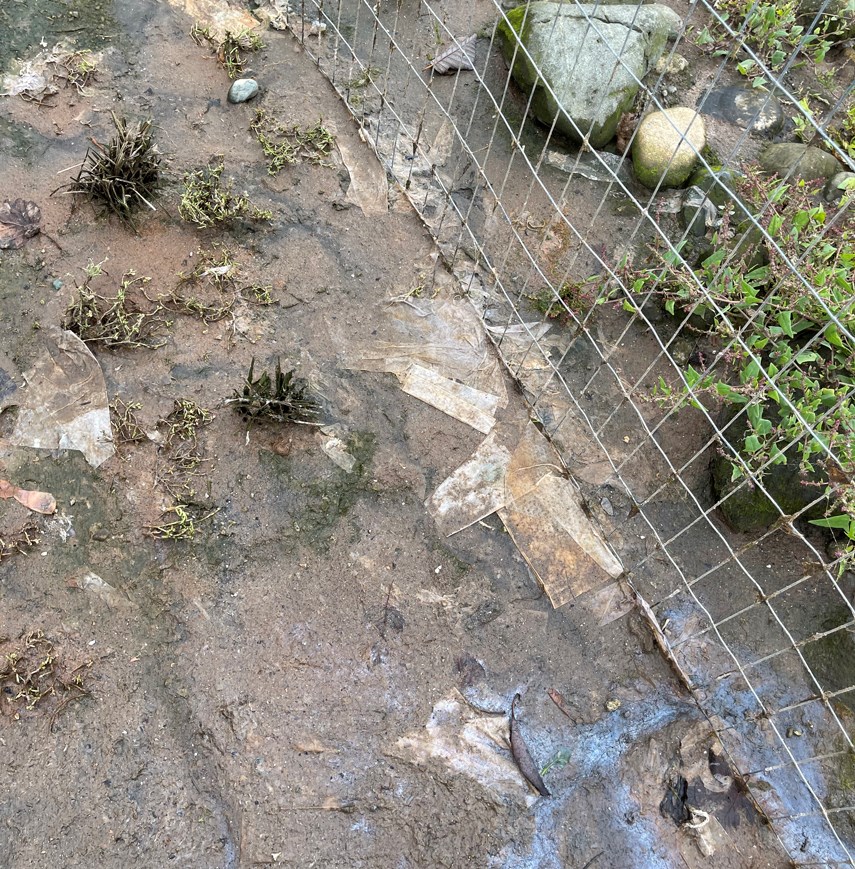Metro Vancouver is investigating a nasty sewage spill on North Vancouver’s Mackay Creek.
Resident James Watson was out for a walk in the area around noon on Sunday (Sept. 19) when he noticed the unmistakable stench.
“I smelled a really strong odour,” he said. “Everything was just coated in sewage.”
Apart from being grossed out, Watson said he was disturbed to see how many sanitary wipes were mixed in with the mess.
“The amount of plastic garbage that got released into the inlet via wipes, I just couldn’t believe how much was hung up in that once concentrated area,” he said. “It was astounding.”
Watson immediately reported the mess to the Ministry of Environment, both North Vancouver municipalities and Metro Vancouver, which has jurisdiction over sewage lines.
According to Metro, there was an overflow from an outfall pipe that extends into Burrard Inlet near the end of Seaspan’s dock on Friday.
The system’s alarm indicated the overflow around 3:15 p.m. on Friday – a day that saw about 100 millimetres of rain fall in 24 hours. Metro immediately sent an environmental consultant to the area but they found “no visual evidence of wastewater debris at or near the outfall location,” said Ross Maki, division manager for Metro.
After Watson’s report of sewage in the creek on Sunday, Metro sent their consultant back for a deeper investigation, which found the outfall was the most likely source.
“They're doing remedial water quality sampling, and they're doing a video inspection of that outfall pipe to confirm,” Maki said. “In the meantime, I had Metro Vancouver crews clean up any visible debris, because regardless of the reason for being there, it just shouldn't be there."
When municipal storm drains are overwhelmed with rain and groundwater, they tend flow into pipes that were mainly designed to handle raw sewage, Maki said.
“As you can appreciate, much of this infrastructure is quite old,” he said. “There has been significant growth since the original systems were built. … What we should stress is that municipalities need to have programs in place to limit that rainwater from entering their sewer systems.”
This year’s fall run of pink salmon into Mackay Creek has already begun, and chum and coho will be coming soon, said Ron Den Daas, board member with the North Shore Streamkeepers. The e.coli associated with sewage is more dangerous for humans than it is for salmonids, but he said there may be other toxins harmful to native species mixed in.
“We just don’t know what’s in there but it’s not good,” he said.
In speaking with Metro Vancouver, Den Daas said he’s been to told they have plans to replace the sewage pipes – but not until 2050.
“It's very important to upgrade everything as quickly as possible, because we know that our salmon populations are highly impacted on the North Shore and if we don't do more to protect them, we’ll lose them,” he said.
The North Shore’s creeks are hit by chemical spills of different kinds “all the time,” but few are ever reported, Den Daas added.
“It's happening. It’s death by 1,000 cuts,” he said. “That's why it's very important to report these issues, be aware of these issues and try to mitigate them as quickly as possible and encourage our municipalities and different levels of government to do more.”



